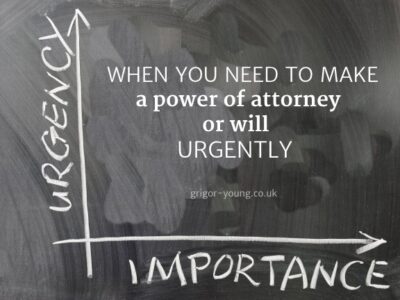It is human nature to put off making a will.
Perhaps it’s because making one is finally admitting we are mortal and one day will die. However, it has been proven that putting off this decision doesn’t make any difference to your life expectancy.
Making a will earlier, in a planned manner and without any family pressures means you can prepare better for the future. Once you have made a will, amending it as you grow older is much less daunting.
The process is easy.
You need to sit down and plan how you want to distribute everything you own (or may own) when you die. If you prepare a will then your estate will, to a large extent, be distributed in the way you want and not in the way that might happen without a will. (For more about what happens if there is not a will in place, see the Prior Rights page on this website).
Sometimes it is necessary to make a will urgently.
This may be because of some sudden change in your personal circumstances. If it is urgent, your solicitor will attend at a hospital or your home to take instructions and will return to see you to make sure your will is properly signed.
When dealing with elderly clients, solicitors will also make home visits to prepare a will or a power of attorney.
EC regulations and Law Society rules require solicitors to give clients not only Terms and Conditions (also known as a letter of engagement) but, in the case of a home or hospital visit, a “cooling off period” notice – not too dissimilar from those given by double-glazing salesmen. There the similarities end (!).
As solicitors, we are often asked by a relative of an elderly person to visit them at home or in hospital.
Often, this is to take instructions for a will or power of attorney (POA).
The client is always the person making the will or POA and we have to make sure the client knows what they want to do and that they are fully aware of terms of the document that are going to sign.
In the case of POA, a solicitor or doctor must, in addition, provide a certificate with the registration form, confirming that the client was interviewed before and after signing and knew what they were signing.
Occasionally, as a solicitor we will decline to sign a certificate.
This can be upsetting for the person’s family.
However, if we are not confident that the client knows what they are about to sign – or if we have any concerns – then we will refuse to proceed.
We are entitled to ask medical staff for a second opinion and sign the certificate saying that we have relied on a doctor.
At Grigor & Young a situation has occurred twice in the last 12 months where we have refused to sign a certificate. It is a role that we, as solicitors, must and do take seriously.
It is crucial to think about making a will or Power of Attorney when it’s only important.
In other words, get it done before making a will or POA becomes not only important but urgent as well.
Remember: it’s never too early to consult your solicitor but it can be too late.
How we can help
If you have any questions about any matters raised in this article, please contact us. All initial enquiries are at no charge and without obligation. We are keen to have as much helpful content on our website as possible. Questions allow us to consider how we can clarify and improve the information provided on this website.
You can get in touch with a member of our Private Client team by calling 01343 544077. Alternatively, send us a Free Online Enquiry.


